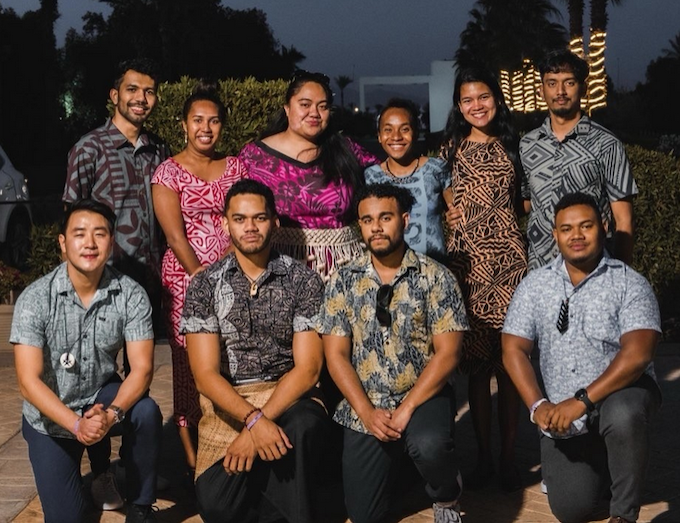By Vahefonua Tupola in Suva
The University of the South Pacific (USP) is at the heart of a global legal victory with the International Court of Justice (ICJ) delivering a historic opinion last week affirming that states have binding legal obligations to protect the environment from human-induced greenhouse gas emissions.
The case, hailed as a triumph for climate justice, was driven by a student-led movement that began within USP’s own regional classrooms.
In 2021, the government of Vanuatu took a bold step by announcing its intention to seek an advisory opinion from the ICJ on climate change. But what many may not have realised is that the inspiration behind this unprecedented move came from a group of determined young Pacific Islanders — students from USP who formed the Pacific Island Students Fighting Climate Change (PISFCC).
- READ MORE: How Pacific students took their climate fight to the world’s highest court. And won
- The Pacific Community (SPC) climate justice resource
- Climate Justice at the ICJ
- Other Pacific climate justice reports
According to the United Nations background information, these USP students led the charge, campaigning for years to bring the voices of vulnerable island nations to the highest court in the world.
Their call for accountability resonated across the globe, eventually leading to the adoption of a UN resolution in March 2023 that asked the ICJ two critical legal questions:
- What obligations do states have under international law to protect the environment?
- What are the legal consequences when they fail?

The result
A sweeping opinion from the ICJ affirming that climate change treaties place binding duties on countries to prevent environmental harm.
As the ICJ President, Judge Iwasawa Yuji, stated in the official delivery the court was: “Unanimously of the opinion that the climate change treaties set forth binding obligations for States parties to ensure the protection of the climate system and other parts of the environment from anthropogenic greenhouse gas emissions.”
USP alumni lead the celebration
USP alumna Cynthia Houniuhi, president of the PISFCC, shared her pride in a statement to USP’s official news that this landmark opinion must guide not only courtrooms but also global climate negotiations and policy decisions and it’s a call to action.
“The law is on our side. I’m proud to be on the right side of history.”
Her words reflect the essence of USP’s regional identity, a university built not just to educate, but to empower Pacific Islanders to lead solutions to the region’s most pressing challenges.
Why is the ICJ’s climate ruling such a big deal? Video: Almost
Students in action, backed by global leaders
UN Secretary-General Antόnio Guterres, in a video message released by the UN, gave credit where it was due.
“This is a victory for our planet, for climate change and for the power of young people to make a difference. Young Pacific Islanders initiated this call for humanity to the world, and the world must respond.”
Vishal Prasad, director of PISFCC, in a video reel of the SPC (Secretariat of the Pacific Community), also credited youth activism rooted in the Pacific education system as six years ago young people from the Pacific decided to take climate change to the highest court and today the ICJ has responded.
“The ICJ has made it clear, it cemented the consensus on the science of climate change and formed the heart of all the arguments that many Pacific Island States made.”
USP’s influence is evident in the regional unity that drove this case forward showing that youth educated in the Pacific are capable of reshaping global narratives.

A win for the Pacific
From coastal erosion and rising sea levels to the legacy of nuclear testing, the Pacific lives with the frontline effects of climate change daily.
Coral Pasisi, SPC Director of Climate Change & Sustainability, highlighted in a video message, the long-term importance of the ruling:
“Climate change is already impacting them (Pacific people) and every increment that happens is creating more and more harm, not just for the generations now but those into the future. I think this marks a real moment for our kids.”
Additionally, as Ralph Regenvanu, Vanuatu’s Minister for Climate Change, noted to SPC, science was the cornerstone of the court’s reasoning.
“The opinion really used that science as the basis for its definitions of accountability, responsibility, and duty.”
Among the proud USP student voices is Siosiua Veikune, who told Tonga’s national broadcaster that this is not only a win for the students but for the Pacific islands also.
What now?
With 91 written statements and 97 countries participating in oral proceedings, this was the largest case ever seen by the ICJ and it all began with a movement sparked at USP.
Now, the challenge moves from the courtroom to the global stage and will see how nations implement this legal opinion.
Though advisory, the ICJ ruling carries immense moral and legal weight. It will likely shape global climate negotiations, strengthen lawsuits against polluting states, and empower developing nations especially vulnerable Pacific Islands to demand justice on the international stage.
For the students who dreamed it into motion, it’s only the beginning.
“Now, we have to make sure this ruling leads to real action — in parliaments, at climate summits, and in every space where our future is at stake,” said Veikune.
Vahefonua Tupola is a second-year student journalist at University of the South Pacific’s Laucala Campus. Republshed from Wansolwara News, the USP student journalism newspaper and website in partnership with Asia Pacific Report.
This post was originally published on Asia Pacific Report.